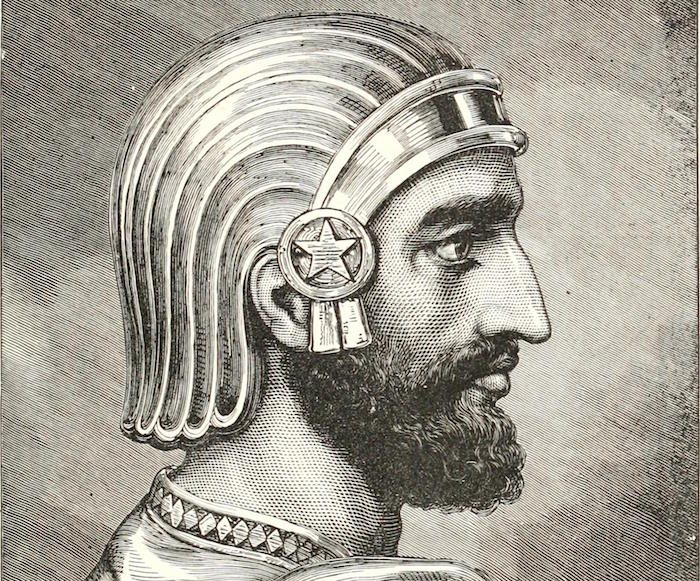Once a month here on the Molten Sulfur Blog, I run content taken from our book Archive: Historical People, Places, and Events for RPGs. This post is one of eighty entries in Archive, each more gameable than the last!
This post is brought to you by beloved Patreon backer Arthur Brown. Thanks for helping keep the lights on! If you want to help keep this blog going alongside Arthur, head over to the Patreon page – and thank you!

Cyrus the Great
King of Many Legends
Cyrus was born sometime between 590 B.C and 580 B.C to the governor of Persia and the daughter of Astyages, the king of Media. He was the founder of the Achaemenid Persian empire, which stretched from the Mediterranean Sea to modern-day Pakistan. According to Xenophon’s legend of Cyrus, he was a tolerant, ideal monarch, seen by the ancient Persians as the father of his people. In the Bible, he was the liberator of the Jews held captive in Babylon. Cyrus was a man whose tales weave between truth and legend.
According to one legend, Astyages feared his daughter’s offspring and arranged for her to give birth while under his control. When Cyrus was born, Astyages gave him to a loyal follower to be slain. The follower could not bring himself to kill a baby, so he gave Cyrus to a shepherd to raise. At the age of 10, Astyages discovered Cyrus. Despite his fear, Astyages let Cyrus live. After Cyrus’ father died, Cyrus inherited rulership of Persia, and raised the Persians in revolt against his maternal grandfather and king. Astyages marched against Cyrus, but his army deserted him, forcing him to surrender in 550 B.C.
When word of Astyages’ fall came, the king of Lydia, in modern Turkey, enlarged his domains at the expense of Media. Cyrus, though Persian, was successor to the Median king, so he marched on Lydia. He captured the Lydian capital in 547 B.C. One source says that the king of Lydia burned himself to death when the capital was captured. Another says he was taken prisoner by Cyrus and treated well. Once the king of Lydia was defeated, the ethnically Greek cities on the Turkish coast became subject to Cyrus. Most of them submitted to him after short sieges.
Next Cyrus targeted Babylonia, where the people were dissatisfied with their ruler, giving him a pretext for invading the lowlands. The conquest was a quick one. Even the priests of Marduk, the national deity of Babylon, abandoned the Babylonian king in favor of Cyrus. In 539 B.C., Babylon fell to the Persians. In the Bible, Cyrus was famous for allowing Jewish captives in Babylon to return to their homeland. He was also tolerant towards the Babylonians. He supported local customs and even sacrificed to local deities. The capture of Babylon delivered Mesopotamia, Syria, and Palestine to the hands of Cyrus. The ruler of Cilicia had become allies with Cyrus when the latter marched against Lydia, allowing Cilicia to retain a special status in Cyrus’ empire. By a blend of diplomacy and force of arms, Cyrus established the largest empire known in his time.
Cyrus was no Persian chauvinist. He was happy to learn from the people he conquered, and he united Media and Persia in a type of dual monarchy. Cyrus borrowed traditions of kingship from Media, and probably made a Mede his advisor. There was little innovation in government, but rather a willingness to borrow and adapt. His effort in uniting the cultures of the people he conquered helped form Achaemenid culture and civilization.
Cyrus the Great in Play
With all the evil tyrants that stain stories, it’s good to have at least one celebrated ruler at the table, even if only as a moral compass. An NPC based on Cyrus can be one in the middle of his conquests, giving orders to some of your PCs or even asking their strategic advice. Perhaps the PCs are given a quest by one of Cyrus’ enemies to assassinate him, but they discover how much the people love him. Maybe one of your PCs was one of the captives in Babylon, and is grateful to the ruler for freeing her. In a campaign, Cyrus the Great would be a definite lawful good type.






